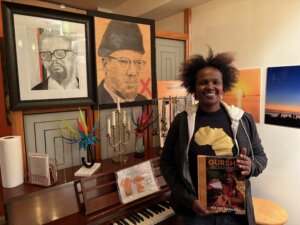Uncategorized
In HBO’s new Stephen King series, the Holocaust is fuel for jump scares
This article contains spoilers for the first episode of the HBO Max series It: Welcome to Derry.
In the first episode of It: Welcome to Derry, it’s immediately clear that the local high school has a bullying problem. Kids stuff pickle jars in the locker of a girl whose father died in a pickle jarring accident. The Bert the Turtle mascot (it’s set in 1962 after all) is knocked around. But among the bullies stands Theodore “Teddy” Uris, a kinder, more compassionate teenage boy. It may come as no surprise that he’s Jewish.
A prequel to the 2017 movie of It, based on Stephen King’s novel, the series starts with the disappearance of the friendless and abused Matty Clements. Teddy immediately feels guilty, wondering if he could’ve prevented Matty from running away by being nice to him. Teddy’s friend Phil, who is much more interested in spying on female neighbors as they undress, doesn’t understand why Teddy cares.
Jewish men are often painted as less masculine and more sensitive than their non-Jewish counterparts. This is sometimes done derisively, although in Derry, which was developed by Andy and Barbara Muschietti, the brother-sister director-producer team behind It and It Chapter 2, and Jason Fuchs, co-writer of Wonder Woman, it makes Teddy one of the most likeable characters.
What feels more shocking is the way the show incorporates the Holocaust to torment him, although King’s work has mined the Holocaust for horror fodder in the past, such as in the novel Apt Pupil.
Shabbat dinner at the Uris household starts off normally, with the Hebrew prayers for wine and challah (incorrectly identified as “Yiddish” in the subtitles). Teddy, who is haunted by the idea that Matty is still alive, asks his dad, Rabbi Uris, if it’s possible for someone to be held underground for months. His father chides Teddy for what he thinks is his son’s wild imagination. Rabbi Uris reminds Teddy that his grandparents survived Buchenwald, where Jewish skin was allegedly turned into lampshades.
“We are Jews, Theodore,” he says. “We know better than anyone the real horrors of this world. Reality is terrifying enough as it is. Cut it out with the fantasy.”
That night, as Teddy reads a Batman comic, his lamp begins to turn off on its own. The third time he turns it back on, he is greeted with a lampshade sewn out of groaning faces.
Although the episode is packed with creepy moments — some are so overdone as to verge on parody — this scene feels the most disturbing. You may or may not believe in the two-headed devil baby that flies at us in the beginning of the episode, but the horrors of the Holocaust are very real. Behind the otherworldly spectre of the lampshade is true torture and abuse.
It feels almost exploitative to use the Holocaust for shock value. For many years, claims that Nazis turned the skin of Jewish prisoners into objects were seen as too controversial to discuss. Some feared that the claims were so outlandish, it would give credence to Holocaust deniers. Although it’s not clear if this was a common Nazi practice, at least one lampshade recovered from Buchenwald was confirmed to have been sourced from human skin. Should one really be using the skinned faces of Holocaust victims for a jump scare?
There’s something to be said for how Pennywise, Derry’s resident demon clown, mines the psychology of his victims to terrorize them, and surely the Rabbi’s comments about the Shoah affect Teddy’s young mind. But one can point to epigenetic Jewish trauma in other ways.
In It, the Jewish character Stanley Uris (Teddy’s nephew) is haunted in his synagogue by what looks like a surrealist Amedo Modigliani figure. It’s a Jewish haunting in setting and source (Modigliani was Sephardic), but it didn’t play on specific Jewish trauma the way the lampshade does.
Maybe the whole point of Derry is to take things up a notch from its predecessor. It certainly doesn’t pull any punches in the final scene of the episode: Multiple children are brutally murdered on screen, something most shows tend to avoid depicting in detail. The first — and most graphic kill — is Teddy.
The post In HBO’s new Stephen King series, the Holocaust is fuel for jump scares appeared first on The Forward.
Uncategorized
Ethiopian-American Jews lament loss of Harlem restaurant hub

For over a decade, Tsion Cafe, which owner Beejhy Barhany believes is the only Ethiopian Jewish restaurant in America, introduced patrons to injera, shakshuka spiced with berbere, and the flavors of Ethiopian-Jewish cuisine. But more than that, it introduced many patrons to Ethiopian Jews for the first time.
“I’ve been the ambassador, willingly or unwillingly,” Barhany said. “On the forefront, bringing and pushing for Jewish diversity.”
She recalled a moment that, for her, encapsulates the spirit of Tsion Cafe: feeding gursha — the Ethiopian tradition of placing food directly into someone’s mouth as a gesture of love — to an elderly Ashkenazi Jewish woman.
“She was open to receiving it! Someone who would never eat with their fingers,” Barhany said, laughing. “And she couldn’t stop.”
For Ethiopian Jews in America, a community numbering only a few hundred, Tsion Cafe was one of the only public-facing outposts of their heritage. But earlier this month, Barhany, who has been serving up Ethiopian Jewish delicacies to the Harlem community since 2014, announced on Instagram that she would close the restaurant’s dining room for “security reasons,” a move first reported by the New York Jewish Week.
Barhany told the Forward she has received “a lot of hate, phone calls, harassment,” including someone scrawling a swastika on the front of the restaurant. “You kind of push it aside, you disregard it. But at the end of the day, there is an impact emotionally, and it becomes a burden. I said to myself, ‘You know what? It’s just not worth it. It’s too much to deal with.’”
Despite the closure, Barhany remains determined to continue to share Ethiopian Jewish culture with patrons through catering and private events. “We are pivoting for security reasons because we have been threatened,” she said. “It’s not gone. We are reinventing ourselves. We are not giving up.”
The ‘October 8th Impact’
Barhany was born in Ethiopia and spent three years in a Sudanese refugee camp before moving to Israel in 1983, where she later served in the Israeli Defense Forces — a path shared by many Ethiopian Jews of her generation.
Ethiopian Jews lived for centuries in Ethiopia, maintaining ancient Jewish traditions and largely isolated from the broader Jewish world. In the 1980s and early 1990s, amid widespread instability in Ethiopia, Israel carried out dramatic covert airlift operations which brought tens of thousands of Ethiopian Jews to Israel. For many, their connection to Israel is rooted not only in longstanding religious tradition, but also in the lived experience of those rescue missions.
“Ethiopian Jews are very loyal to Jerusalem and to the people of Israel,” said Dr. Ephraim Isaac, an Ethiopian Jewish scholar based in New Jersey. “All the Ethiopian Jews I know living in America have relatives in Israel, and they go back and forth.”
When she arrived in New York in the early 2000s, Barhany was struck by how little awareness Americans had of the African Jewish diaspora. Wanting to educate her new neighbors about her background, and searching for a sense of “community and belonging,” she opened Tsion Cafe in 2014.
After the violent attacks on Israelis on October 7, 2023, Barhany said she felt the desire to be more public about her Judaism and her connection to Israel. “It was that October 8th impact. You just wanted to be a proud Jew,” she said. That impulse pushed her to make Tsion Cafe fully kosher and vegan. “I thought, ‘How can I have my people come here and feel comfortable?’ And also introduce Ethiopian food to people who never had it before.”

She also became more outspoken about her Jewish heritage and her connection to Israel, appearing in cooking videos with popular pro-Israel influencer Noa Tishby, and posting photos of herself at a pro-Israel rally shortly after the October 7 attacks. As pro-Palestinian protests unfolded across New York City, particularly on nearby college campuses like Columbia University, she said she understood that her outspokenness could make her a target.
But for Barhany, there was no other option. “I celebrated proudly and amplify my identity. I never shy away from that,” she said. “Otherwise I wouldn’t be true to myself.” She says her advocacy “happened organically, sincerely, genuinely, because who I am.” “I didn’t sign up for this,” she said, laughing. “But I am happy to engage with those people and maybe broaden their understanding of Jewish Diaspora.”
A small community, a singular space
For many in the United States’ small Ethiopian Jewish community, Tsion Cafe’s closure represents more than a business shift; it marks the disappearance of one of the only visible spaces representing their culture in America.
Isaac estimates the Ethiopian Jewish population in America numbers only a few hundred.“They came here just like other members of Israeli society,” he said, for education, work, or opportunity. Some say they came to the U.S. to get away from discrimination they experienced in Israel. The largest cluster, he noted, is in Jersey City, with smaller communities in Brooklyn and Queens. “We respect each other, we love each other, but never lost contact,” he said.
Barhany said that for many in the American Ethiopian Jewish community, Tsion Cafe was seen as “a home far away from home” with community members traveling from across the country to come to her restaurant. “We have people coming from D.C., L.A., you name it,” she said.
“I think a majority of Ethiopian Jews in America know Beejhy,” Isaac remarked. “The community is very upset by the closure. She is respected for all the efforts that she has undertaken.”
Tali Aynalem, a 34-year-old Ethiopian Jew who lives in Oregon, said Tsion Cafe challenged longstanding assumptions about what Jewish identity looks like in the U.S.. “In America, there is an idea of one way that a Jewish person looks like. I always sort of have to explain who I am. It’s not just understood.”
For Aynalem, Tsion Cafe was bringing to light the diversity of Jews and Israelis to an American audience. “She really was showing what Israel is all about, which is that we are so mixed because we’ve all been in exile in so many different places for so long. She showed that in her restaurant.”
But Aynalem sees the restaurant’s closure as part of a broader trend.“People are quick to say, ‘It’s a Black-owned business, it’s a small business, support it.’ But as long as there’s an intersection with Judaism, there’s no support,” she said. “It raises the question: do you care about Black people, or do you just not care about Jews, regardless of color?”
She added that, as an Ethiopian Jewish woman, she once believed her racial identity shielded her from certain forms of antisemitism.
“For a long time, I felt like that extra layer of being Black almost protected me, because people are scared of being called racist,” she said. “They’re not scared of being called antisemitic.”
In the wake of rising threats and Tsion Cafe’s closure, she said, that sense of insulation has faded.
“It shows you that antisemitism, regardless of what you look like, doesn’t really discriminate,” she said. “I don’t think I have that extra armor anymore. No one is really safe in this climate.”
Aynalem also worries that Ethiopian Jews in America are still understood primarily through the lens of rescue. She said that for many American Jews, the only thing they know about Ethiopian Jews is stories of the dramatic operations that brought them to Israel.
“We’re past that,” she said. “Let’s talk about my generation. We’re part of the culture. People are eating injera, that’s a normal occurrence within Israeli culture now.” For Tali, Tsion Cafe was doing exactly that.
Barhany agrees.
“I always see articles about Ethiopian Jews being rescued,” she said. “I’m kind of fed up with that.” For her, Tsion Cafe was a way to “bring something more positive and more unifying” to the American conversation about Ethiopian Jewish life.
Not just for Ethiopian Jews
Rabbi Mira Rivera of JCC Harlem said Tsion Cafe was woven into the fabric of Jewish life in the neighborhood. “The Ethiopian Jews in Harlem aren’t going anywhere,” she said. “But it was always a joy to have a bastion, a place where you’d say, ‘Let’s meet at Tsion Cafe. Let’s celebrate your birthday there.’ It was part of living in Harlem.”

She compared Tsion Cafe to the Ethiopian Jewish neighborhoods she had visited in Israel, places where a community had a visible center. “This was that place,” she said. “It was where people gathered. Over the years, they changed to vegan and kosher so that the larger Jewish community would start to understand and partake in their culture.” She continued, “to not have that place where all the families can go, it’s really hard.”
But for Barhany, Tsion Cafe was never meant to be “just a cafe.” “I didn’t want it to be a regular cafe where you go in, sit, pay, and go,” she said. “It’s a place where people can nourish and engage in grown-up conversation.”
Amid antisemitic threats, she remains more committed to that mission than ever. Barhany plans to host interfaith gatherings and travel the country to share the flavors and stories of Ethiopian Jewish culture.
“If I can facilitate dialogue, I would be honored,” she said.
“We are not giving up. We are still here. We’re just coming in a different shape or form.”
The post Ethiopian-American Jews lament loss of Harlem restaurant hub appeared first on The Forward.
Uncategorized
Tucker’s Ideas About Jews Come from Darkest Corners of the Internet, Says Huckabee After Combative Interview

US Ambassador to Israel Mike Huckabee looks on during the day he visits the Western Wall, Judaism’s holiest prayer site, in Jerusalem’s Old City, April 18, 2025. Photo: REUTERS/Ronen Zvulun
i24 News – In a combative interview with US Ambassador to Israel Mike Huckabee, right-wing firebrand Tucker Carlson made a host of contentious and often demonstrably false claims that quickly went viral online. Huckabee, who repeatedly challenged the former Fox News star during the interview, subsequently made a long post on X, identifying a pattern of bad-faith arguments, distortions and conspiracies in Carlson’s rhetorical style.
Huckabee pointed out his words were not accorded by Carlson the same degree of attention and curiosity the anchor evinced toward such unsavory characters as “the little Nazi sympathizer Nick Fuentes or the guy who thought Hitler was the good guy and Churchill the bad guy.”
“What I wasn’t anticipating was a lengthy series of questions where he seemed to be insinuating that the Jews of today aren’t really same people as the Jews of the Bible,” Huckabee wrote, adding that Tucker’s obsession with conspiracies regarding the provenance of Ashkenazi Jews obscured the fact that most Israeli Jews were refugees from the Arab and Muslim world.
The idea that Ashkenazi Jews are an Asiatic tribe who invented a false ancestry “gained traction in the 80’s and 90’s with David Duke and other Klansmen and neo-Nazis,” Huckabee wrote. “It has really caught fire in recent years on the Internet and social media, mostly from some of the most overt antisemites and Jew haters you can find.”
Carlson branded Israel “probably the most violent country on earth” and cited the false claim that Israel President Isaac Herzog had visited the infamous island of the late, disgraced sex offender Jeffrey Epstein.
“The current president of Israel, whom I know you know, apparently was at ‘pedo island.’ That’s what it says,” Carlson said, citing a debunked claim made by The Times reporter Gabrielle Weiniger. “Still-living, high-level Israeli officials are directly implicated in Epstein’s life, if not his crimes, so I think you’d be following this.”
Another misleading claim made by Carlson was that there were more Christians in Qatar than in Israel.
Uncategorized
Pezeshkian Says Iran Will Not Bow to Pressure Amid US Nuclear Talks

Iranian President Masoud Pezeshkian attends the Shanghai Cooperation Organisation (SCO) Summit 2025, in Tianjin, China, September 1, 2025. Iran’s Presidential website/WANA (West Asia News Agency)/Handout via REUTERS
Iranian President Masoud Pezeshkian said on Saturday that his country would not bow its head to pressure from world powers amid nuclear talks with the United States.
“World powers are lining up to force us to bow our heads… but we will not bow our heads despite all the problems that they are creating for us,” Pezeshkian said in a speech carried live by state TV.


